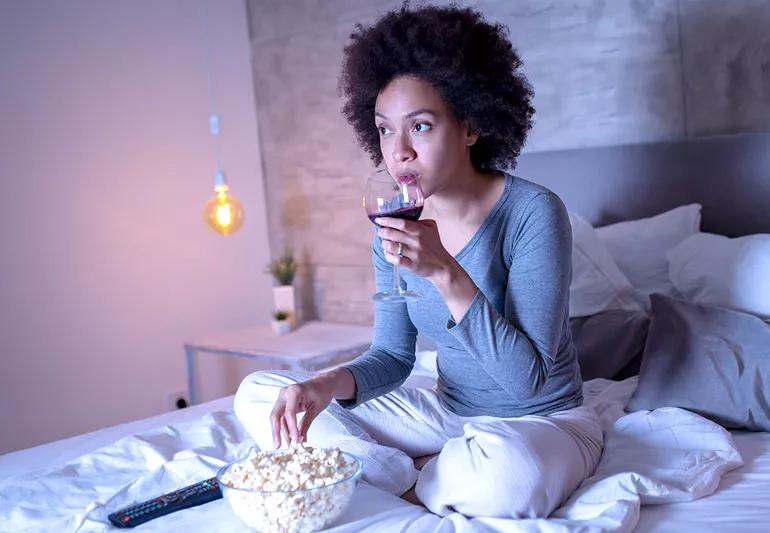Skipping the alcohol late-night may actually give you sweeter dreams

Image content: This image is available to view online.
View image online (https://assets.clevelandclinic.org/transform/8902a01f-7403-4137-b103-52ebc6f59f7b/wineBeforeBed-1162765822-770x533-1_jpg)
woman having wine and popcorn in bed
Sure, that nightcap, last glass of wine or beer before bed may help you feel sleepy. But it can actually end up robbing you of a good night’s rest — or worse, could cause some challenging sleep problems.
Advertisement
Cleveland Clinic is a non-profit academic medical center. Advertising on our site helps support our mission. We do not endorse non-Cleveland Clinic products or services. Policy
”While it’s true that alcohol is a sedative, both having it in your system as well as the process of it wearing off can cause a variety of different problems,” says neurologist and sleep expert Jessica Vensel Rundo, MD. “You’re likely to experience fragmented sleep, insomnia or possibly more serious sleep issues.
Each night, your sleep has stages or cycles. Your deep restful sleep tends to be more prevalent in the first few hours but decreases during the second half. Then REM (your dreaming sleep) follows as the night goes on.
If you have alcohol in your system when you hit the hay, you may not sleep very deeply, or for very long, on and off throughout the night. That’s because as alcohol starts to metabolize, the sedative effect wears off.
“This prevents you from getting the deep sleep and rapid eye movement (REM) sleep you need because the alcohol in your system keeps you in lighter stages of sleep,“ Dr Vensel Rundo says. “You’ll likely wake up easily and more often, especially in the later half of the night.”
Besides just waking you up a lot, alcohol can disrupt your normal sleep patterns enough to create some longer-term issues you may need to address.
Vivid dreams and nightmares — With alcohol in your system you’re more likely to have intense, colorful dreams and nightmares as you sleep patterns ebb and flow. You may or may not remember them, but they can be lucid or give you a feeling that you are half awake and half asleep. Because at some point, you might actually be.
Advertisement
Sleepwalking and parasomnias — You may experience moving a lot or talking while you’re sleeping. There’s a chance you’ll physically act out your dreams in your sleep, or even sleepwalk.
You may also experience parasomnias which are disruptive sleep disorders that occur in specific stages of sleep or in sleep-wake transitions. These can happen during arousals from rapid eye movement (REM) sleep or non-rapid eye movement (NREM) sleep.
Breathing problems — Since alcohol’s sedative effect extends to your entire body, including your muscles, it may allow your airway to close more easily while you’re asleep. This can greatly increase the risk of sleep apnea especially if you drink within the last couple of hours before bedtime.
“Like many other drugs, if you drink alcohol before bedtime, you can expect to wake up with some degree of grogginess,” Dr. Vensel Rundo says. ‘Your body will need to compensate for the lack of good sleep you didn’t get and your alertness may be impaired.”
With extended use of alcohol over time, there can be long-term concerns, too. Many who abuse alcohol often do it well into the night and oversleep into the next day. In time this may lead to switching up day and night sleeping patterns. Then, as withdrawal from the drug or alcohol occurs there’s a big sleep-wake reversal which then needs to be addressed.
“Existing research also shows alcohol decreases your melatonin levels, the hormone that regulates your internal clock,” she says. “If you become dependent on drugs or alcohol, over time you could get your days and nights mixed up.”
Simply cutting back or giving up alcohol or other drugs can be enough to reverse the negative impacts on your sleep (and can greatly improve your health overall).
“But if you have continued sleep issues that don’t go away,” Dr. Vensel Rundo suggests, “it’s a really good idea to have a conversation with a sleep specialist.”
Advertisement

Sign up for our Health Essentials emails for expert guidance on nutrition, fitness, sleep, skin care and more.
Learn more about our editorial process.
Advertisement
Separate sleeping arrangements can improve sleep, mental health and even your partnership
Wearing no clothes could lead to cooler skin temperatures that put ZZZs within reach
Expert tips from sleep specialists to get your sleep back on track
How to prevent time-change sleepiness
Listen to your child to help them identify their fear and name it, but don’t reinforce it
Have a consistent routine and heap on the positive reinforcement
From pulling on ears and hyperactivity at night to irritability and napping during the day
Type 2 diabetes isn’t inevitable with these dietary changes
Applying a hot or cold compress can help with pain
Pump up your iron intake with foods like tuna, tofu and turkey